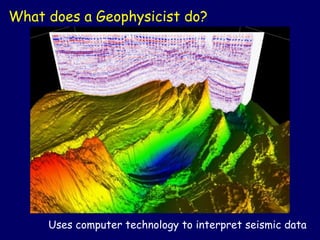All Categories
Featured
Table of Contents
What Is A Seismic Survey? in Bedford Aus 2020
This work is increasingly contracted out, so consultancies provide another source of employment. Consultancy firms differ in size, from really small companies to big multinationals. Some consultancies are quite specialised in using specific geophysical strategies or operating in specific locations, while others provide a more diverse variety of services to their clients.
The extraction of gas from land fill websites is another area of employment and this might grow in the future. Exploration companies might carry out work for building and construction firms, public utility, mining companies and ecological companies, so geophysicists may be used in any of these settings. Other employers consist of: geological surveysgovernment bodies and agenciesuniversities and research institutes.


Vacancies might be noted in the oil and gas sector press. Recruitment is affected by oil cost changes and the level of competitors for positions differs depending upon this. Professions Days, which cover the complete variety of geoscience professions and are usually gone to by a number of crucial industry employers, are run by The Geological Society.
Geophysical Services in Darling Downs Western Australia 2021
A few of the big oil and gas companies use a full two-year structured training programme throughout the breadth of geophysics, consisting of the chance to experience work in numerous teams before specialising in one location. Your training may include work on: existing wellsmagnetic and gravitational potential field information analysisresearchrock analysis. It's more typical for your preliminary training to be provided on the job.

There might be a probationary period throughout which you work together with a skilled coworker. Competency-based appraisals occur frequently in many firms. In smaller sized companies, and for academic posts, there is not likely to be any formal training - you'll be anticipated to begin work straightaway and get skills as you go along.
If you work for a smaller sized business, you may discover that you require to take obligation for organizing and funding your own development and training. If you have a geology degree, membership of The Geological Society can be useful for networking and for maintaining to date with the industry.
Job Profiles : Geophysicist Physics in Carmel Australia 2020
You may likewise find it beneficial to join the PESGB (The Petroleum Exploration Society of Great Britain, which has a geophysics unique interest group. After a probationary period, and once you've acquired some experience, you might progress to senior geophysicist, then group leader and then into a senior function in management.
The ease of motion between functions depends on the business structure. Research study at Masters or Ph, D level in a subject associated to geophysics or geosciences may assist with your career advancement and development. The employment market within the oil and gas market is extremely based on cost and this may affect your chances for profession development.
Not all tasks are dependent on the oil and gas industries. For experienced geophysicists, freelance consultancy provides an excellent route for profession development. You can likewise specialise in a specific area of geophysics. As a geophysicist, you're likely to have numerous tasks throughout your working life. Worldwide mobility is vital for dealing with peaks and troughs in various nations at various times.
Geophysical Prospecting in Westfield Australia 2022
From geophysics, it's possible to focus on seismology (completing more training to end up being a seismic interpreter) or to move into related areas such as engineering geology or threat forecast.
Choosing what to study in college is a hard option. Even if you understand that your field of interest lies in science, what program of research study is right for you?
The first action to accomplishing your objective of becoming a geophysicist is making a degree. Even for entry-level positions in the field of geoscience, you'll need a bachelor's degree (a geophysicist college degree) from an accredited college or university. Geophysicists must be able to: evaluate rocks, photographs, and other pieces of information carry out research study both in the field and in laboratories produce maps and charts of their findings write reports To accomplish all this, trainees need a specialized education for geophysicist professions.
As specified above, you'll require a bachelor's degree in geoscience or a related discipline, such as a physical science or a life sciences, to land an entry-level task. Trainees can likewise prepare by majoring in topics like: Biology Chemistry Computer science Engineering Mathematics Physics The above geophysicist majors use a more generalized approach to a single clinical discipline, however most programs require trainees to take one or more geology course.
Table of Contents
Latest Posts
How To Become A Geophysicist in Pickering Brook Aus 2023
What Does A Geophysicist Do? Role & Responsibilities in Wembley Downs Western Australia 2023
Geophysical Surveys As Landscape Archaeology in Shelley WA 2021
More
Latest Posts
How To Become A Geophysicist in Pickering Brook Aus 2023
What Does A Geophysicist Do? Role & Responsibilities in Wembley Downs Western Australia 2023
Geophysical Surveys As Landscape Archaeology in Shelley WA 2021